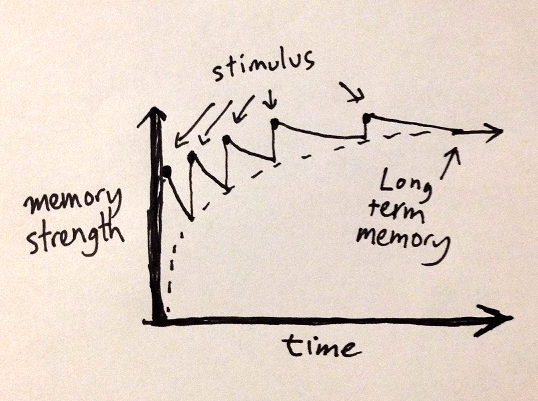As someone who has this problem themselves, I should have an answer for you. The sad thing is, after many years, I don't know whether I do. I'm still learning too.
I have exactly that reaction/experience as you describe it. Its not one I choose or indulge, and I try to not let it kick in, but, after a lifetime, I'm still nowhere near beating it. But I know it better than I did, and I'm less a victim of its effects.
I'm writing this to offset those who say it's a sign of immaturity, and give you a sense what it can be like, to have your head fighting against itself in some way like you're portraying. The closest I can come is that feeling everyone's had, "I want to but I can't", jumping off somewhere high, walking past the haunted house as a kid, we all know that feeling briefly. For some people, it's not about houses and falls, it's internal reactions to things long ago that still remain potent everyday triggers, that have outstayed their use and become generalised and trigger on everyday life. Maybe that's how it is for her, maybe not. I'm assuming she truly wishes it were different, and isn't just indulging in idleness. Show her this. Ask her. Then listen.
What doesn't help much? Hmm.
Being pushed or pressured about it by others makes it worse not better - now as well as feeling bad for something I don't like about myself, I can get others telling me how I ought to feel bad too, or their magical ideas to fix it which work fine in theory, and how odd that they get affronted when I say that in that lifetime I might just have tried that already and it doesn't help. I can see what's happening, I don't know how to fix it. Set alarms, write notes, feel good, feel bad, lose out from it (money, friends, whatever)... you name it. Not one of them really made any difference or resolved it.
What have I found that does help?
I've found that just like others pushing too hard, makes it harder, so does pushing myself, in the bullying/pressuring sense. Accepting its hard for me, that I need to not beat myself up internally over it, that it needs gentleness from oneself. Its a bit like a leg that cramps too much; you get over it faster if you aren't reacting by forcing and beating it, or cussing it out, or having the world and their friend telling you how this means you're letting everyone down and how bad you are (One knows and feels it anyway, so, thanks for reminding me what a disaster I am and how much it needs to get going now, guys. What a pity that the leg isn't listening and is doing its own thing, despite that gem of wisdom. Maybe you'd better tell me next time, too. Huh).
So my first breakthrough was realising how inside, I was being very self critical. I ought to be able to, anyone else can, just get it done. Brutality to oneself doesn't help, even to oneself. If it did, it would be fine by now. Like OCD or depression, have you ever seen people get over those gifts of neurology by being "helpfully" beaten up emotionally about it by people who don't have a clue? Me neither.
What else helps? Time. Not just long time, but reaction time. A lot of it (for me anyway) is triggered but then it can get easier or harder to get past it.
- Someone sits over me judgingly: hard.
- Someone getting going by starting their stuff and inciting me to join them in working on mine: easier.
- Someone who argues more and gets angry/upset when I can't: hard.
- Someone who can hold back a bit, not get wound up, and helps me to remember that maybe "try in a little" works and gives a hug: easier.
- Someone who understands its a symptom of pressure and doesn't add more, and looks for other ways to help me over the hump: easier.
- Learning to say "My heads in a bad space, can you ask me that in a while (so I can digest this bit of pressure before the next bit hits)": easier.
- Having friends and family willing to try and avoid triggering it or making it worse because of pressure they feel: easier.
Perspective and humour also help a lot, they take a bit of the edge off, and again, help by giving time to manage things: easier and fun too; I get notes like this left for me in odd places and a fair amount of the tine it works. Much better:

Time also matters because I've found its a narrower effect than I realised. For me anyway, that is. For many years, it seemed to splurge all over my life, because I didn't see it clearly, and I didn't know what was going on. With experience I've learned it can be managed, like diabetes or migraines. Cant avoid it, can get more experience at mitigating and anticipating it, so it doesn't cause such a grade 1 problem + stress to me and everybody. Some kinds of situation and things trigger it more than others. The actual hurdle might not be all of the task, it might be in (say) actually starting rather than continuing once started, or could be some specific part/stage of the task. So that's another area I can find workarounds in. I've learned to recognise better when I'm getting stuck that way, and what help I need, and to express/be open about it: "My heads freezing on it, I'm not getting anything done and its been days". Takes courage and trust to be able to be open about "shameful" failings, especially when there is no easy answer. You can foster that between you.
There's others. A lot comes down to how one perceives it, and seeing that its not monolithic, it hits some things, some triggers, some times and ways, and those can be noticed, patterns spotted, help asked or offered when they occur.
(And as an afterthought, even if this sort of thing isn't what's going on, guess what? The odds are good its still going to be fairly useful advice until you do find out what's up)

